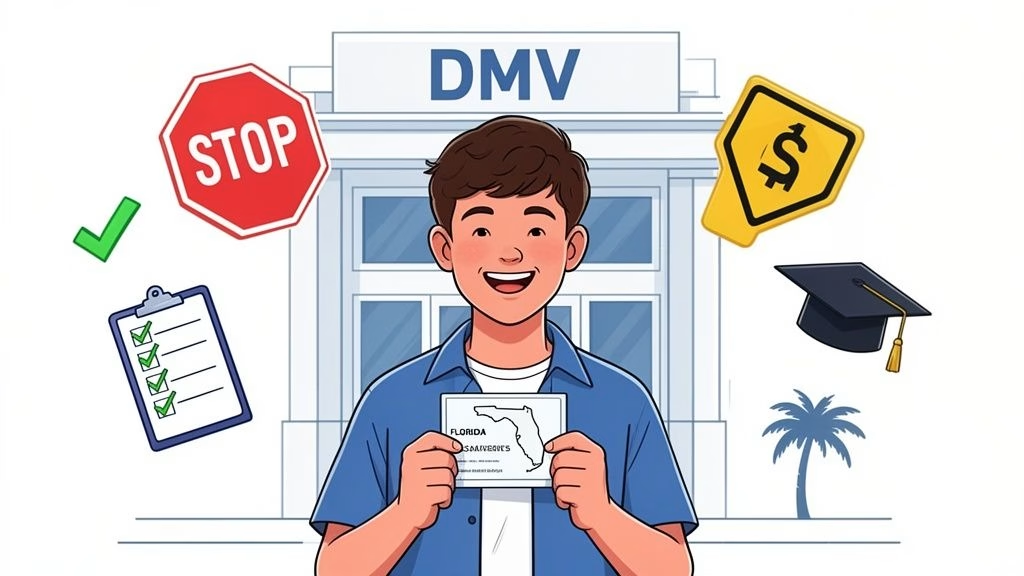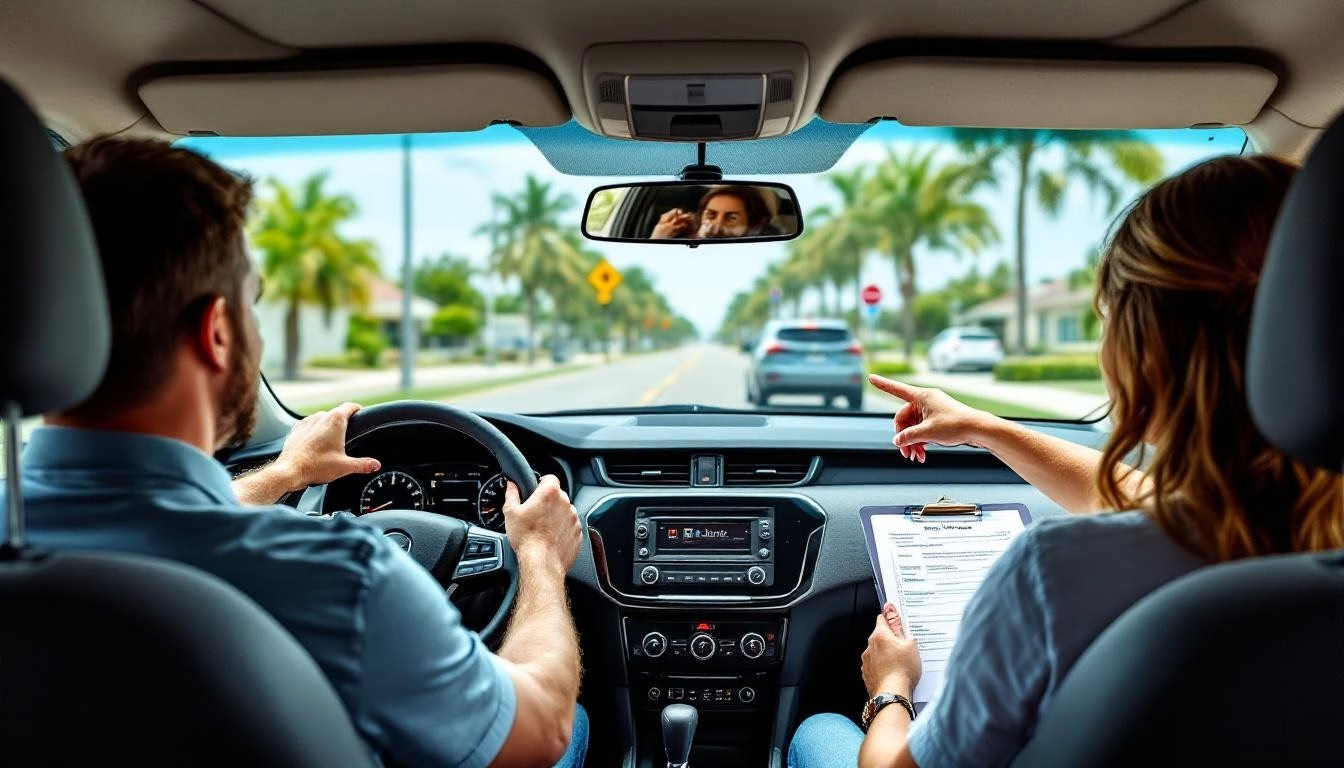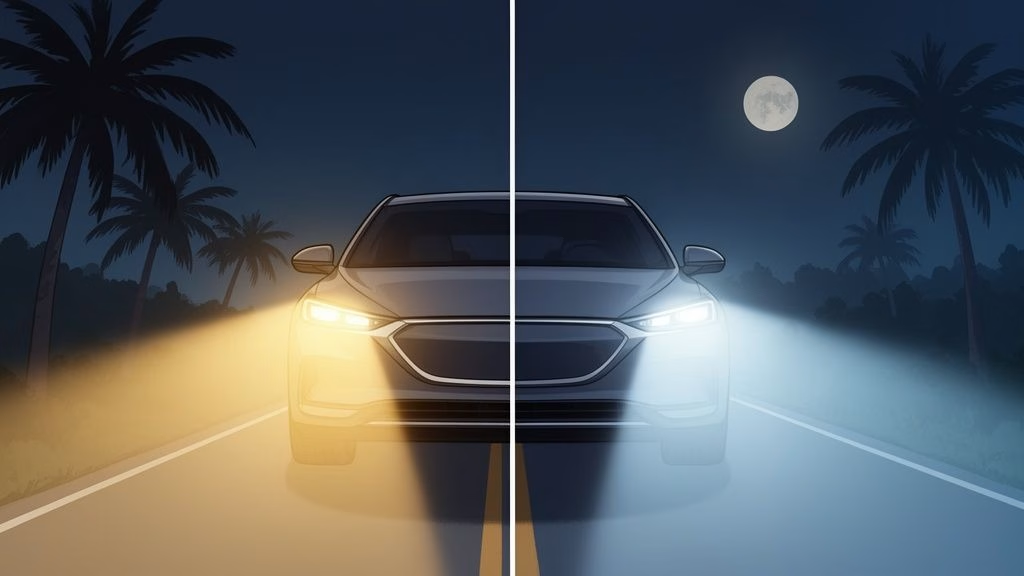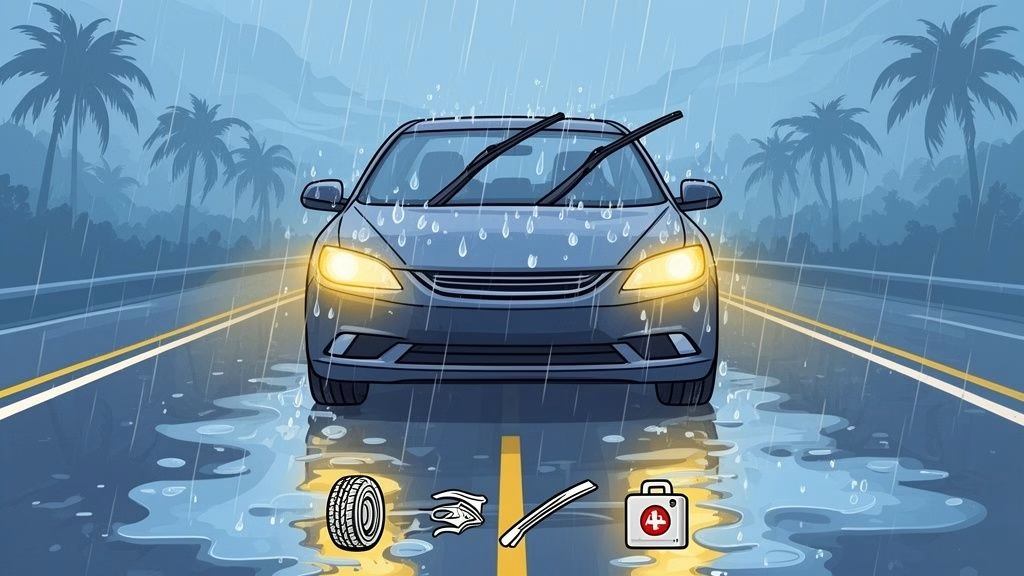Driving in the Sunshine State is a unique experience, whether you’re a lifelong local, a snowbird, or one of the millions of tourists hitting our roads each year. This guide cuts through the dense legal language to give you a straightforward, practical rundown of Florida�s most important driving laws.
Think of this as your personal co-pilot for navigating Florida’s highways and byways safely and confidently.
Navigating Florida Driving Laws
Knowing the rules of the road in Florida isn’t just about avoiding a ticket�it’s about keeping yourself and everyone else safe. For new residents moving to Florida, getting a handle on these statutes is one of the first and most important steps to settling in.
Our laws are designed to manage a truly diverse mix of traffic, from the non-stop rush of I-95 to the slow crawl along A1A and the quiet streets of suburban neighborhoods.
Believe it or not, Florida didn’t even require a formal driver’s license before 1939. As cars became common, the need for order grew. Fast forward to 1969, and various agencies were combined to form the Florida Department of Highway Safety and Motor Vehicles (FLHSMV), the same body that oversees our bustling transportation network today.
At their heart, Florida�s driving laws exist to create a predictable and safe environment for everyone on the road�from the daily commuter to the family on vacation.
What This Guide Covers
We�ve structured this guide to be a practical resource, breaking down complex topics into simple, easy-to-digest sections. The goal is to give you the knowledge you need to get behind the wheel with confidence, whether you�ve lived here for decades or are just visiting for the week.
Here’s a quick look at what we’ll cover:
- Speed Limits and Right-of-Way: We’ll dive into the logic behind different speed zones and how to navigate those sometimes-tricky Florida intersections.
- DUI Laws and Penalties: A clear look at the severe consequences of driving under the influence.
- Insurance Requirements: Understanding the minimum coverage you absolutely must have to drive legally.
- The Driver’s License Point System: We�ll explain how traffic violations can affect your driving record and privileges.
Each section builds on the last, giving you a complete picture of what it means to be a responsible driver here. For an even deeper dive, the official https://bdischool.com/florida-drivers-manual is the ultimate source. By the time you’re done, you�ll have a solid roadmap for staying safe and on the right side of the law.
Mastering Speed Limits and Right-of-Way Rules

Every state�s roads have their own unique rhythm, and Florida is no exception. Getting the hang of our speed limits and right-of-way rules is the key to driving safely and keeping your record clean. These aren�t just random numbers and suggestions; they’re designed to keep traffic moving smoothly and safely, whether you’re on a quiet neighborhood street or a sprawling interstate.
Think of it this way: speed limits are the baseline for safety, set based on everything from the road’s design to how much traffic it sees. Following them isn�t just about avoiding a ticket�it’s a core part of being a responsible driver.
Decoding Florida Speed Limits
In Florida, we have “statutory” speed limits that apply by default, even if you don’t see a sign. Of course, if a sign is posted, that�s the number you follow, as it�s specific to that exact stretch of road.
Here’s a quick look at the default speed limits you�ll find across the state.
Florida Statutory Speed Limits
This table breaks down the basic speed limits you need to know. Think of these as the default rules of the road unless a sign tells you otherwise.
| Zone Type | Statutory Speed Limit (MPH) |
|---|---|
| Municipal/Business/Residential Area | 30 MPH |
| School Zone (During active hours) | 20 MPH |
| Rural Interstate | 70 MPH |
| Limited Access Highways | 70 MPH |
| All Other Roads and Highways | 55 MPH |
Remember, these are the maximum speeds for ideal, sunny Florida days. You’re legally required to slow down when dealing with rain, heavy traffic, or construction. It’s all about adjusting to the conditions.
For a deeper dive into the specifics, you can learn more about all the official Florida speed limit laws to make sure you’re always covered.
A major new law is hitting the books on July 1, 2025, and it�s a big deal. The state is cracking down on “dangerous excessive speeding.” If you�re caught driving 50 MPH over the limit or 100 MPH or faster, it’s no longer just a pricey ticket. It can now mean jail time and a mandatory court appearance.
The Critical Move Over Law
One of the most important rules on our roads is the Move Over Law. It�s all about protecting the people who work on our roadsides, from law enforcement and first responders to utility workers.
If you see any vehicle on the shoulder with its lights flashing, here’s what you must do:
- Move Over: If it�s safe, move one full lane away from the stopped vehicle. This creates a crucial safety buffer.
- Slow Down: If you can’t move over because of traffic, you must slow down to 20 MPH below the posted speed limit. If the speed limit is already 20 MPH or less, you need to drop your speed to 5 MPH.
This law has expanded to cover any stationary vehicle with its hazard lights on, including tow trucks and even a regular driver with a flat tire. A little space can make a life-or-death difference.
Navigating Intersections and Right-of-Way
Intersections are where things get tricky and where most accidents happen. That�s why right-of-way rules are so vital�they�re basically a system for taking turns so everyone knows who goes first.
At a classic four-way stop, the first car to arrive gets to go first. Simple. If two cars get there at the same time, the driver on the left yields to the driver on the right.
Roundabouts are popping up more and more. The key here is to always yield to the traffic already in the circle. Wait for a safe gap, enter, and then you have the right-of-way until you exit. Merging onto a highway works on the same principle: the cars already on the highway have the right-of-way, and it’s your job to yield and find a safe spot to merge.
Understanding these rules takes the guesswork out of driving and helps you make safe, confident decisions in the blink of an eye.
Understanding Florida DUI Laws and Consequences

Getting charged with a DUI in Florida isn’t like a typical traffic ticket. It�s a serious charge that can turn your life upside down, hitting you with legal, financial, and personal problems that can stick around for years. The state has a no-nonsense policy on impaired driving, and for good reason�it�s all about keeping everyone on the road safe.
Knowing these laws isn�t about trying to find a way around them. It’s about truly understanding the enormous risk you take when you drive impaired. Florida�s approach is built on very clear legal limits and penalties that are intentionally harsh to make anyone think twice.
Florida has been fighting this battle for a long time. In fact, it was one of the very first states to outlaw drunk driving way back in 1917, long before we had the technology to measure Blood Alcohol Concentration (BAC). Back then, enforcement was all based on an officer’s observations, a far cry from the scientific precision used today. You can actually learn more about the evolution of these early regulations to see just how far we’ve come.
The Numbers That Define Impairment
At the heart of Florida’s DUI laws are the Blood Alcohol Concentration (BAC) limits. Simply put, your BAC is just a measurement of how much alcohol is in your system. If you go over these legal thresholds, you’re looking at a DUI.
For most drivers over 21, the line in the sand is 0.08% BAC. The standards are much tighter for commercial drivers, who can be charged with a DUI at just 0.04%.
Florida also enforces a strict zero-tolerance policy for anyone under 21. If a young driver is caught with a BAC of 0.02% or higher, they face an automatic six-month license suspension on the very first offense. That limit is so low that even one drink could be enough to land an underage driver in serious trouble.
The Implied Consent Law
This is a big one. One of the most important parts of florida state driving laws you need to know about is “implied consent.” The moment you accept a Florida driver’s license, you’ve legally agreed to take a chemical test�like a breath, blood, or urine test�if an officer has probable cause to believe you�re driving under the influence.
Saying “no” won’t get you off the hook. In fact, refusing the test has its own separate penalties.
- First Refusal: Your driver’s license is automatically suspended for a full year.
- Second (or more) Refusal: This is upgraded to a first-degree misdemeanor. You�re facing an 18-month license suspension and could even spend time in jail.
Here’s the kicker: refusing to take the test can be used against you in court. A prosecutor can argue that the reason you refused was that you knew you were drunk, which can be a very convincing piece of evidence for a jury.
Penalties Get Harsher Each Time
The consequences for a DUI conviction in Florida are severe, and they ramp up significantly with every offense. The system is designed to be a powerful deterrent, using a combination of big fines, potential jail time, and losing your driving privileges for a long time.
A first-time DUI is already a massive headache, but the fallout from repeat offenses can be truly life-altering.
Breakdown of DUI Penalties
Let’s break down what you can expect, starting with a first offense.
First DUI Conviction:
- Fines: Between $500 and $1,000.
- Jail Time: Up to six months.
- License Revocation: A minimum of 180 days.
- Community Service: A mandatory 50 hours.
- Ignition Interlock Device (IID): You’ll need one for up to six months if your BAC was 0.15% or higher. This device requires you to blow into it to prove you’re sober before your car will start.
Second DUI Conviction (within 5 years):
- Fines: Between $1,000 and $2,000.
- Jail Time: A mandatory 10 days, with a maximum of nine months.
- License Revocation: A minimum of five years.
- Ignition Interlock Device (IID): Required for at least one full year.
For a third offense and beyond, the consequences get even worse. These are often treated as felonies, which means mandatory prison time and the possibility of having your license permanently revoked. The message from the state is crystal clear: impaired driving is a dangerous choice with consequences that can follow you forever.
Florida’s Car Insurance Requirements
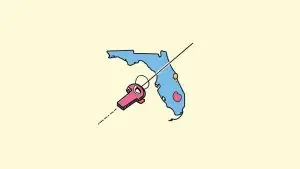
In Florida, having car insurance is more than just a good idea�it�s the law. Think of it as your non-negotiable ticket to legally get behind the wheel. The state uses a “no-fault” system, which might sound a little confusing at first.
Basically, it just means your own insurance company is the first line of defense for your own injuries after a crash, no matter who caused it. This system is designed to get medical bills paid quickly without waiting for a long, drawn-out process to determine who was at fault. To stay on the right side of these florida state driving laws, you have to carry a certain amount of coverage at all times.
The Two Mandatory Coverages
Florida keeps it simple, requiring every driver to have two specific types of coverage for any vehicle with four or more wheels. These are the absolute bare minimums you need to register your car and hit the road.
- Personal Injury Protection (PIP): You are required to have at least $10,000 in PIP. This is what covers a portion of your medical bills and lost wages if you’re injured in an accident.
- Property Damage Liability (PDL): You also must carry a minimum of $10,000 in PDL. This coverage pays for the damage you cause to someone else’s property�like their car, fence, or storefront.
It�s important to remember that these are just the minimums. Most experienced drivers will tell you it’s wise to get more coverage, like Bodily Injury Liability (BIL), to better protect your assets. For a deeper dive into your options, our guide on https://bdischool.com/how-to-get-cheaper-auto-insurance can walk you through different policies.
The High Cost of Driving Uninsured
Deciding to drive without insurance is a massive gamble, and the consequences can be severe. Florida doesn’t mess around when it comes to uninsured drivers, and the penalties can spiral into a financial and logistical nightmare fast.
Driving without insurance is like playing a high-stakes game where you can only lose. The potential penalties far outweigh the cost of a basic policy, making continuous coverage an essential part of responsible driving.
If you�re caught driving without proof of insurance, the Florida Department of Highway Safety and Motor Vehicles (FLHSMV) will come down on you with a series of penalties that get worse with each offense.
Consequences for a First Offense:
- Your driver’s license, license plate, and vehicle registration will be suspended.
- You’ll have to pay a $150 reinstatement fee.
- You must show proof of having purchased Florida insurance before you can get your driving privileges back.
This approach of tying fees to driver compliance isn’t new. In fact, Florida has a long history of it, starting back in 1917 with laws designed to fund road safety and infrastructure.
Maintaining Continuous Coverage
The critical term here is continuous coverage. The state has an electronic system that keeps tabs on your insurance status. If your policy lapses�even for a single day�the FLHSMV will be notified, and the suspension process can begin automatically.
The bottom line is simple: you must keep your PIP and PDL insurance active for your entire vehicle registration period. Keeping your policy current is the only way to protect your finances, your freedom to drive, and everyone else on the road.
How the Florida Driver’s License Point System Works
Think of your Florida driver’s license like a credit score for your driving. Every time you’re convicted of a moving violation, the state adds points to your record. This isn’t just about punishment; it’s a system designed to flag drivers who show a pattern of risky behavior behind the wheel.
A single ticket might feel like a minor annoyance, but it’s the accumulation of points over time that leads to real trouble. The more points you rack up in a short period, the closer you get to some serious consequences�including having your license taken away. Understanding this system is crucial for keeping your driving privileges intact and your insurance rates from skyrocketing.
How Different Violations Impact Your Record
Not all tickets carry the same weight. The Florida Department of Highway Safety and Motor Vehicles (HSMV) assigns point values based on how dangerous the violation is. It�s a tiered system that makes a lot of sense when you break it down.
A minor speeding ticket, for instance, will put a few points on your license. But something far more serious, like leaving the scene of an accident, will dump a heavy load of points on your record all at once. This approach ensures the penalty matches the severity of the mistake.
The point system is really an early warning sign. It’s the state�s way of tapping you on the shoulder and saying, “Hey, we’re seeing a pattern here. It’s time to sharpen up your driving before something serious happens.”
Common Traffic Violations and Associated Points
To give you a practical idea of how this works, it helps to see the numbers side-by-side. Here�s a look at some of the most common moving violations in Florida and the points they’ll cost you.
Common Traffic Violations and Associated Points
| Violation | Points Assessed |
|---|---|
| Speeding (15 MPH or less over the limit) | 3 points |
| Speeding (16 MPH or more over the limit) | 4 points |
| Leaving the scene of an accident with damage | 6 points |
| Running a red light | 4 points |
| Reckless driving | 4 points |
| Improper lane change | 3 points |
As you can see, a couple of “minor” tickets can quickly add up and put your license in jeopardy.
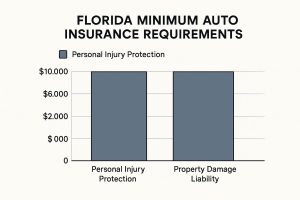
Reaching the Suspension Threshold
The state keeps a running total of your points, and if you hit a certain number within a specific timeframe, your license is automatically suspended. There�s no wiggle room here; these thresholds are hard and fast.
The state looks back from the date of your most recent ticket to see how many points you’ve accumulated. It works like this:
- 12 points within 12 months triggers a 30-day suspension.
- 18 points within 18 months triggers a 3-month suspension.
- 24 points within 36 months triggers a 1-year suspension.
It�s a rolling clock, so you always have to be aware of your recent driving history. For a deeper dive into how violations can impact your record, you can learn more about how many florida points on license can lead to different outcomes.
Can You Reduce or Remove Points?
Okay, so you got a ticket. Is your record permanently stained? Not necessarily. Florida law provides a valuable escape hatch for drivers who want to be proactive.
For many common violations, you have the option to attend a Basic Driver Improvement (BDI) course. When you choose this path and successfully complete a state-approved school, the points for that specific ticket are withheld from your license. It’s a fantastic way to keep your record clean.
This isn�t a get-out-of-jail-free card you can use endlessly, though. You�re limited to using this option once every 12 months and only five times in your entire life. Still, choosing to take a BDI course when you’re eligible is one of the smartest moves you can make to protect your driving record.
Special Rules for Tourists and Teen Drivers
Florida’s roads are a melting pot. You’ve got lifelong residents, teenagers just getting their licenses, and millions of tourists enjoying the sunshine. This unique mix means the state has some specific Florida state driving laws aimed directly at teen drivers and out-of-state visitors.
Getting a handle on these rules is the key to keeping your drive safe and avoiding any surprise encounters with law enforcement.
For new teenage drivers, Florida uses a system called the Graduated Driver Licensing (GDL) program. It’s basically driving with training wheels. The whole idea is to let teens build real-world experience in safer, lower-risk situations before they’re handed the keys with no restrictions.
The program works by limiting common high-risk scenarios for young drivers, like driving late at night or with multiple friends in the car�situations that are statistically proven to lead to more crashes.
Navigating the Teen Driving Curfews
A huge part of the GDL program is the strict curfews, which loosen up as a driver gets older and more experienced. These time restrictions are taken seriously and are a fundamental piece of the graduated licensing system.
Here�s how the driving curfews break down for minors with a Florida license:
- 16-Year-Old Drivers: Are not allowed to drive between 11:00 PM and 6:00 AM.
- 17-Year-Old Drivers: Have a slightly later curfew and cannot drive between 1:00 AM and 5:00 AM.
Now, there are a couple of common-sense exceptions. A teen can be on the road during these restricted hours if they’re driving to or from a job, or if a licensed driver who is at least 21 years old is in the passenger seat.
Understanding Tourist and New Resident Rules
If you�re just visiting the Sunshine State or you�ve recently moved here, most of the rules of the road are what you’d expect. But a few specific regulations can catch newcomers off guard and lead to a ticket you didn’t see coming.
The most frequent question we hear is about using an out-of-state license. As a tourist, your valid driver’s license from another state or country is perfectly fine to use. The catch comes when you move here. Once you officially become a Florida resident, the clock starts ticking�you have just 30 days to get a Florida driver’s license.
For tourists, a valid out-of-state or international driver’s license is all you need. The crucial step for new residents is getting a Florida license soon after moving to stay on the right side of the law.
Florida also has a few other quirks. We have a massive network of toll roads, most of which use the SunPass system. We’re also particular about window tinting. The front side windows must let more than 28% of light through, so if you’re visiting from a state with darker tint laws, you might get a second look from a state trooper.
One last tip for visitors: if you’re renting a car, remember that you’re on the hook for any traffic violations. Red light camera tickets and unpaid tolls will be traced back to the rental company, which will then pass the bill�and often a hefty administrative fee�on to you. A little prep can make your Florida road trip a lot more enjoyable.
Answering Your Top Florida Driving Questions
Even after covering the basics, you’re bound to have some specific “what if” questions about Florida’s driving laws. That�s completely normal. Let’s dig into a few of the most common situations drivers ask about, from using your phone to dealing with a ticket when you’re just visiting.
Think of this as the practical side of things�the real-world scenarios that pop up when you’re actually on the road. Getting these right can save you from a hefty fine, points on your license, or a dangerous mistake.
Can I Use My Phone While Driving in Florida?
Florida has some very specific rules here. The big one is that texting while driving is illegal. It’s a primary offense, which means an officer can pull you over for that reason alone�no other violation needed.
But what about talking on the phone? It gets a little more nuanced. You can hold your phone to talk while driving in most places. The major exceptions are:
- School Zones: You must be 100% hands-free.
- Active Work Zones: When workers are present, you also need to be hands-free.
If you’re caught holding your phone in one of these zones, you’ll be facing a moving violation, which comes with fines and points against your license. It’s just not worth the risk.
What Happens if I Get a Florida Ticket with an Out-of-State License?
Don’t make the mistake of thinking a Florida ticket disappears once you cross the state line. It will absolutely follow you home. That’s because Florida is part of the Driver License Compact.
This is essentially an information-sharing agreement between most states. When you get a ticket in Florida, officials report it to your home state’s DMV. Your own DMV will then usually apply its own penalties, which could mean adding points to your record or, for serious offenses, even suspending your license.
Simply put, a Florida traffic ticket doesn’t stay in Florida. You have to deal with it just as seriously as you would a ticket from your home state to avoid serious consequences down the road.
Do I Have to Tell Police I Have a Gun in My Car?
Florida law does not require you to proactively inform an officer that you have a firearm in your vehicle. This is often called having “no duty to inform.” So, if you’re pulled over, you aren’t legally obligated to volunteer that information.
However, the situation changes if you’re asked directly. If a law enforcement officer asks if you have a firearm, you must answer truthfully.
During any traffic stop, the best practice is always to keep your hands visible on the steering wheel and follow the officer’s instructions. While it�s not required, some licensed gun owners choose to inform the officer as a courtesy to ensure the stop goes smoothly for everyone.
Navigating Florida’s driving laws can be tricky, but you don’t have to do it alone. If you’ve received a ticket and need to keep points off your license, BDISchool offers a state-approved, fully online Basic Driver Improvement course that is convenient and effective. Enroll today and protect your driving record with BDISchool.


